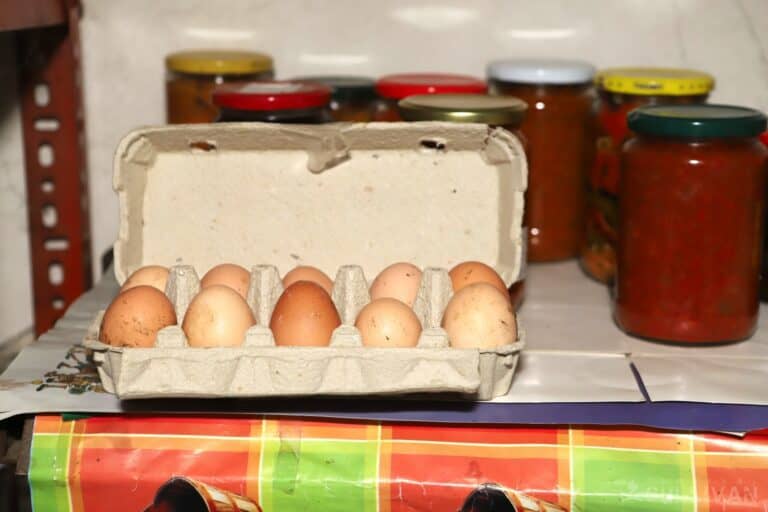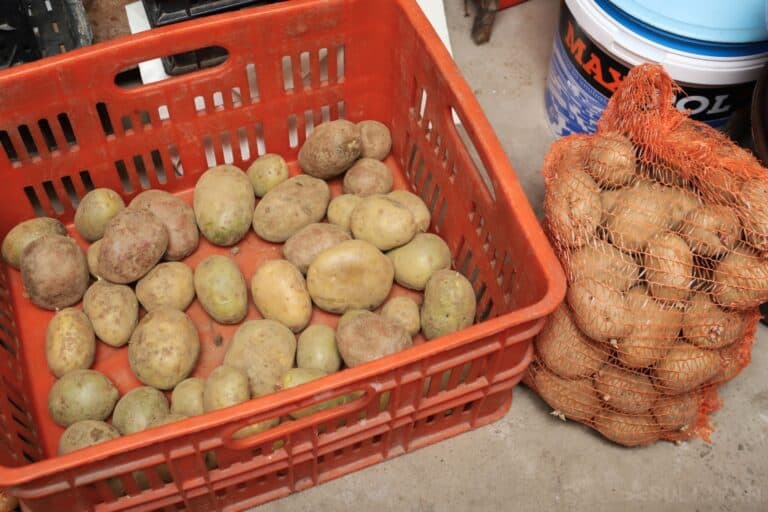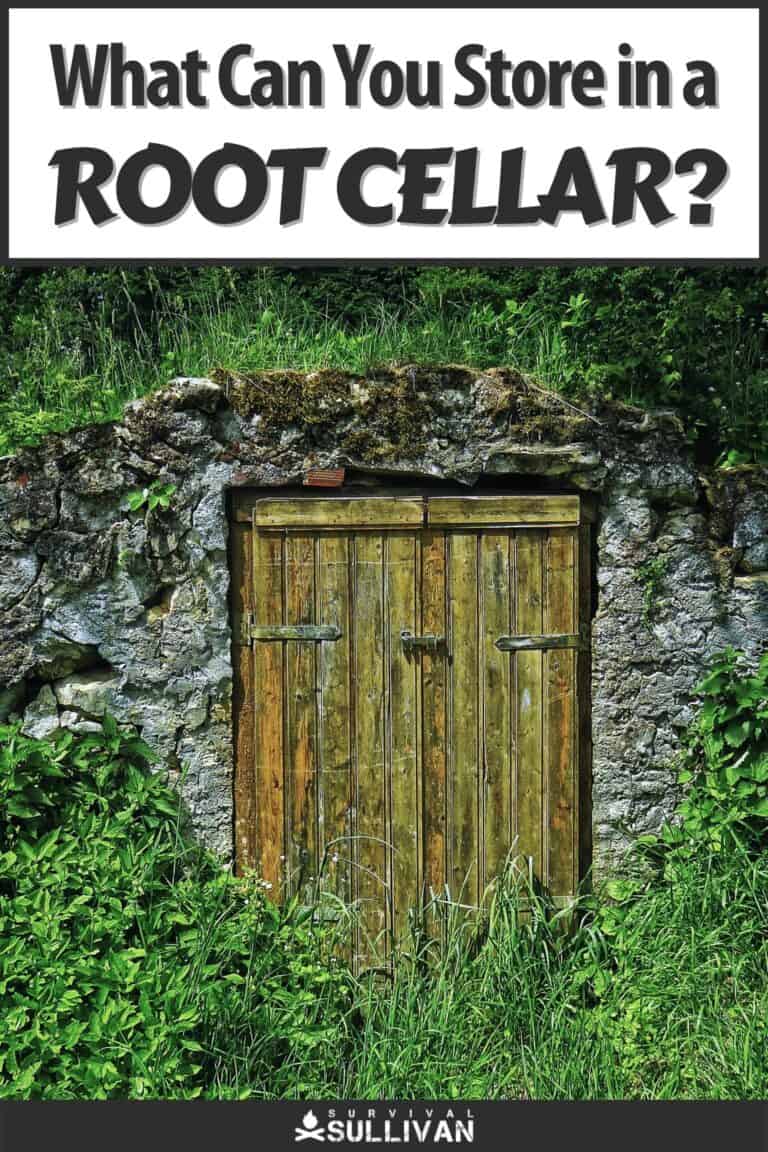One of the benefits of using a root cellar is that it prolongs the shelf life of all kinds of things. This is because root cellars keep at a consistent, usually cooler temperature and humidity level and if properly ventilated keep the air from becoming stale. In addition, root cellars protect stored items from light, which can cause them to spoil prematurely.

So, what exactly can you store in a root cellar?
Root cellars are ideal for storing fruits, vegetables, nuts, herbs and other produce, but are also capable of safely storing and extending the shelf life of meat, dairy products and even bread.
Non-food items can also be kept in root cellars to provide safe storage and a constant temperature that will prevent degradation.
What else might you store in a root cellar? The answer to that question may surprise you! A root cellar is a great place to store fruits and vegetables, but it can also be used for so, so much more!
Imagine, improving the shelf life of your food with absolutely no electricity required. In this article, we will discuss the different things that you can store in a fruit cellar and give you some tips on how to get the most out of your root cellar for all your food preservation and prepping needs!
How Does a Root Cellar Prolong Shelf Life?
When it comes to storing food in a root cellar, there are a few things to keep in mind. Root cellars are cool, dry and ventilated which work together to prevent fermentation and stop bacteria from multiplying, preserving food.
For example, you will want to store produce that is high in sugar content at the bottom of the cellar, since this produce will last longer when it is kept even cooler.
Sugar content promotes fermentation at higher temps! Produce that is low in sugar content can be stored higher up safely, since it is still cool.
You should also avoid packing fruits and vegetables too tightly in the storage bins to avoid bruising them and inhibiting air flow which can reduce moisture levels. Sometimes straw or other media is required to provide padding.
While it is important to understand the basics of storing fruits and vegetables in a root cellar, at the end of the day all you really need to know is that root cellars have worked for centuries.
If you are unsure about how to store your produce in a root cellar, there are plenty of resources available online or from your local hardware store. Just remember to keep your produce in a cool, dark place and give it plenty of ventilation, and you should be good to go!
Now, with that out of the way let’s get to the list.
The Best Things to Store in Your Root Cellar
Fruits
Some of the best fruits to store in a fruit cellar include apples, pears, tomatoes (yes, they are fruits!), tomatillos, oranges, grapes and grapefruit.
These fruits can all be stored for an extended period of time in a cool environment. The biggest advantage to keeping fruits in a root cellar is that it extends their shelf life with little additional work needed from you.
Fruits that are stored in a root cellar can last for months, potentially even a year, depending on the type of fruit. A root cellar is also a great way to keep your fruits from rotting or becoming moldy thanks to the stable atmospheric conditions.
Take care where you place your fruits as some fresh fruits emit gasses that can speed the ripening and subsequent spoilage of other nearby fruits and veggies.

Vegetables
Root vegetables, such as carrots, beets, potatoes, squash, melons and onions are great candidates for storage in a root cellar.
These vegetables tend to last for a longer period of time than other types of vegetables. In fact, many root vegetables can last up to six months when stored in the correct conditions.
Like fruits, having a root cellar is an easy way to keep your vegetables from going bad before you have a chance to eat them.
Many vegetables are also hardier than fruits, and the lower sugar content helps them persist longer even when temps rise a little.
Meat
Meat like ham, bacon, and sausage can be stored in a cool environment to help them last longer.
To store meat in a root cellar, it is important to keep the meat as chilled as possible, meaning near the floor, and ensure ventilation remains constant. The infiltration of pests can be a major challenge for storing your meats in this way.
The best time to store meat in a root cellar is during the winter, when it’s already quite cold outside.
To keep meat safe in a root cellar, keep the doors shut, cracks sealed and as a result the temperature consistent.
You should also make sure that the food is securely wrapped to ensure that no pests or dust can touch it.
It may last for weeks or even months if kept in a cool root cellar, and if the meat is preserved by some other method it could last even longer than that.
Jerkies and other similar meat dishes are excellent candidates for this reason
Dairy
Dairy products like milk and cheese can also be stored in a fruit cellar. Milk will stay fresh for up to two weeks when it is stored in a root cellar, and cheese can last for up to six months.
Hard cheeses, as always, do better than soft cheeses for long term storage. When it comes to cheese, hard cheeses like cheddar, parmesan and Swiss are the best for storing in your root cellar.
Softer cheeses like brie or blue cheese won’t last as long but can benefit from longer life compared to just hanging out on your counter.
This is a great option if you want to have fresh dairy products on hand, especially if you live in a colder climate where your cellar can benefit even more from the ambient temps. In hot climates your root cellar might not ever get cold enough, however!
Herbs
Fresh herbs can also be stored in a root cellar. This is a great way to keep them from going bad and to have them on hand when you need them.
Herbs like parsley, thyme and basil can be stored in a plastic bag or hung from the upper section of your root cellar.
Fresh herbs will easily last a week or two and dried herbs can last for years. Take care when locating your herbs as some fresh herbs emit gasses that can speed the ripening (read spoilage) of fruits and veggies.
Nuts
If you have a nut tree on your property, storing nuts in your root cellar is a great way to take advantage of that fact! Nuts like almonds, walnuts and hazelnuts can last for up to six months when they are stored in proper containers or bins.
It is important to make sure that the nuts are totally dry before you put them away, as wet nuts will spoil quickly and raise the ambient humidity of the root cellar, potentially leading to a devastating chain reaction that could lead to the loss of a whole crop!
Storing them in an airtight container will help to mitigate this issue if they aren’t totally dry.
Bread
Bread is another food that can be stored in a fruit cellar. Bread can last for up to two weeks when stored in a cool, dry place like a root cellar.
This is especially convenient if you live in an area where bread goes bad quickly or you are forced to rely on expensive bread that you purchase from elsewhere.
If you’re looking to store your bread long term, you’ll need to freeze it first. Bread can be frozen for up to two months without any detriment to the quality but if you do that you won’t be keeping it in your root cellar!
Other
In addition to food you can also store other items like wine and beer in a root cellar. Homemade wine will stay fresh for up to six months when it is stored in a fruit cellar, and homemade beer will stay fresh for up to two months.
If you live in a hot climate, however, it’s important to keep your root cellar well ventilated as the extra heat will cause your wine and beer to spoil far more quickly.
You can also store other things like candles, batteries, ammo and non-perishable food items like dehydrated emergency or camping meals in a root cellar, anything that benefits from temperature-stable storage.
This is a great way to have backup supplies on hand in case of a natural disaster or other emergency.
Just make sure that you have enough space to store everything and that the items you’re storing don’t emit any harmful byproducts that could spoil or affect your food!
Conclusion
A root cellar is a great electric-free way to safely extend the shelf lives of your foods and beverages, including produce, meat, dairy and baked goods.
It even works well for storing some other non-food items. A cool, dark, and well-vented environment is perfect for long-term storage of all kinds of things.
Make sure to take advantage of this fact by setting up your root cellar correctly and you’ll be prepared for anything!


Tom Marlowe practically grew up with a gun in his hand, and has held all kinds of jobs in the gun industry: range safety, sales, instruction and consulting, Tom has the experience to help civilian shooters figure out what will work best for them.

What about rodents?
That’s what you got out of the article Ronald?